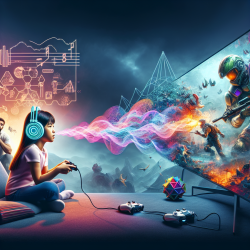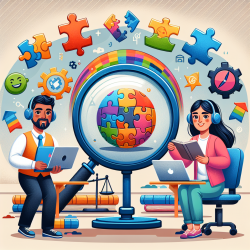Introduction
In the quest to improve auditory processing, especially in challenging environments like noisy classrooms, speech-language pathologists (SLPs) are constantly seeking effective training paradigms. A recent study titled Auditory cognition and perception of action video game players (Stewart et al., 2020) offers intriguing insights into how action video games might influence auditory cognition. This blog post will explore the study's findings and discuss their potential implications for SLPs working with children.
Study Overview
The study investigated whether action video game players (AVGPs) exhibit enhanced auditory cognition compared to non-players (NPs). Researchers tested 80 participants using various auditory and visual tasks, including auditory reaction time and speech-in-noise tasks. While AVGPs showed superior performance in visual tasks, no significant auditory benefits were observed.
Key Findings
- Visual Cognition: AVGPs outperformed NPs in visual tasks, replicating previous findings that video game play enhances visual cognition.
- Auditory Cognition: No significant differences were found between AVGPs and NPs in auditory tasks, suggesting that the benefits of video game play might be modality-specific.
- Cross-Modal Transfer: The study highlights the challenge of achieving far transfer of skills from visual to auditory domains, indicating that training might need to be modality-specific.
Implications for Speech-Language Pathologists
While the study did not find direct auditory benefits from action video game play, it raises important considerations for SLPs:
- Modality-Specific Training: The lack of auditory improvement suggests that auditory training should focus on tasks that directly engage the auditory system, such as listening games or music training.
- Motivational Aspects: Video games are engaging and could be used to motivate children in therapy, even if the games themselves do not directly improve auditory skills.
- Further Research: SLPs are encouraged to explore other forms of auditory training that might benefit from the motivational aspects of gaming, such as audio-based games for the blind.
Encouraging Further Research
The study's findings suggest that further research is needed to explore how different types of games or auditory-focused training might benefit auditory cognition. SLPs can contribute to this research by experimenting with different training modalities and sharing their findings with the broader community.
Conclusion
While action video games may not directly enhance auditory cognition, they offer valuable insights into how different training modalities can be used to engage and motivate learners. By focusing on modality-specific training and leveraging the motivational aspects of gaming, SLPs can continue to improve outcomes for children with auditory processing challenges.
To read the original research paper, please follow this link: Auditory cognition and perception of action video game players.










